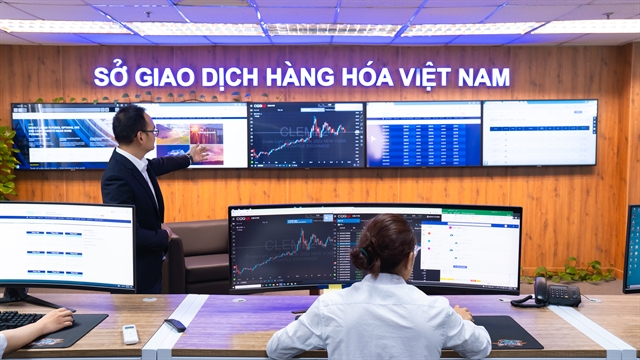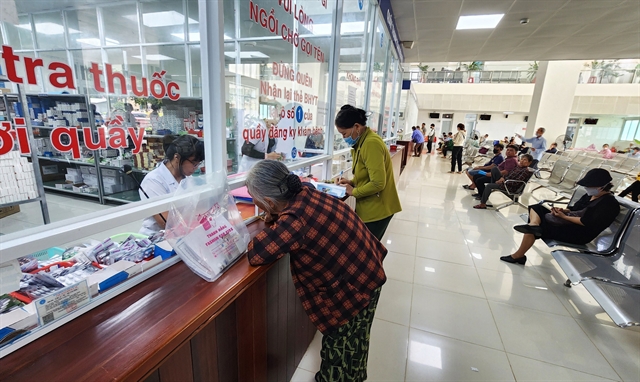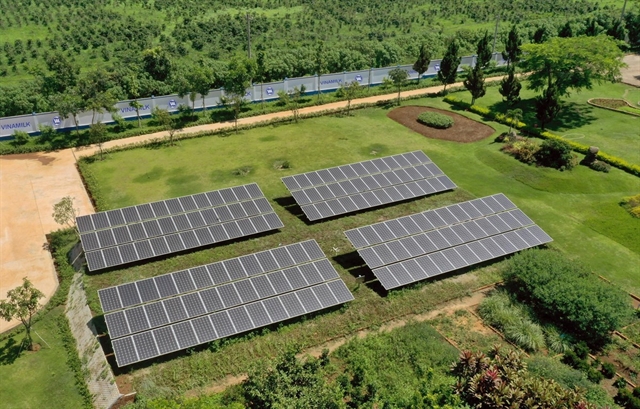 Economy
Economy


|
| A view of a Vinamilk’s solar energy system in Lâm Đồng Central Highlands Province. The green energy transition plays a key role in implementing ESG practices while success in the transition will help Việt Nam reach net zero carbon emissions by 2050. VNA/VNS Photo |
HÀ NỘI — Việt Nam has a great opportunity to attract Environmental, Social and Governance (ESG) investment capital as many international financial institutions and investors are increasing their allocation to sustainable business activities while the Vietnamese government is promoting green growth to meet its commitment of net zero carbon emissions by 2050.
According to experts, the green energy transition plays a key role in implementing ESG practices while success in the transition will help Việt Nam achieve net zero carbon emissions by 2050 as committed at the 26th United Nations Climate Change Conference (COP26). Therefore, it is vital for the country to lure ESG investment capital flow.
Vũ Chí Công, director of ESG division of investment management firm VinaCapital, said foreign enterprises and investors will establish cooperative relationships with local partners, who have the same vision of long-term sustainable values and high information disclosure and transparency.
In the investment case of Denmark’s LEGO Group building a factory worth more than US$1 billion in the VSIP III industrial park in the southern province of Bình Dương, the group's leaders shared with VinaCapital that one of the main reasons for their investment decision is Việt Nam's commitment to reach net zero emissions by 2050 in COP26, Công said.
The opportunity for Việt Nam to attract ESG capital is very large as many foreign financial institutions and institutional investors are also increasing their investment in ESG-related assets.
According to a report by PricewaterhouseCoopers (PwC), asset managers globally are expected to increase their ESG-related assets under management (AUM) to $33.9 trillion by 2026, from $18.4 trillion in 2021.
Asia-Pacific has the fastest percentage growth in ESG AUM, with this expected to more than triple, reaching $3.3 trillion in 2026. A total of 65 per cent of institutional investors in Asia-Pacific (APAC) plan to increase allocation to ESG products in the next two years, according to the report.
A Finastra survey in Hong Kong and Singapore also found that nearly 90 per cent of financial executives say supporting ESG initiatives is important for the banking and financial services industry.
According to Don Lam, VinaCapital’s general director, many banks and international investment funds currently share the same opinion that ESG standards are becoming increasingly important in their investment decisions. That means, in the near future, projects and enterprises that do not meet ESG standards will face difficulty in access to capital.
Sharing the same view, Dr. Nguyễn Hữu Huân, lecturer at HCM City University of Economics, said ESG standards are gradually becoming important criteria in lending and investment decisions of international financial institutions.
ESG and green credit are vital trends and enterprises will gradually have to report on ESG, Huân forecast.
Even domestic financial institutions are also increasingly focusing on ESG in their credit granting decisions.
According to the State Bank of Vietnam (SBV), local credit institutions have increased their assessment of ESG risks in credit granting activities. Outstanding loans which were assessed for ESG risks reached more than VNĐ2.48 quadrillion, accounting for nearly 20 per cent of total outstanding loans by June 30, 2023.
Nguyễn Thanh Sơn, Director of the Vietnam Banks Association’s Training Centre, said the SBV has issued many policies to encourage consideration of ESG aspects in banking industry operations, such as Circular 17 on guiding the implementation of environmental risk management in granting bank loans of credit institutions and foreign bank branches in Việt Nam; Directive 03 on promoting green credit growth and managing environmental and social risks in credit granting activities; and a handbook on guiding credit institutions on assessing environmental and social risks for 15 economic sectors that have the highest risks to the environment and society in credit granting activities.
These policies are considered the initial foundation to establish an ESG framework system in the operations of banks and credit institutions in accordance with international rules, Sơn said.
Challenges
Experts said to avoid missing the great opportunity to lure the ESG investment capital source, Việt Nam needs to further promote the implementation of ESG practices among local enterprises. Under Việt Nam’s current legal regulations, only enterprises which have revenue of more than VNĐ100 billion and are listed on the stock exchange are required to disclose ESG. Therefore, the number of enterprises that have ESG practices has remained restricted.
According to a PwC's ESG practice readiness report in private enterprises in Việt Nam, 60 per cent of enterprises participating in the survey said they lack knowledge about ESG.
Nguyễn Chí Hiếu, consulting director of KPMG's ESG programmes in Vietnam and Cambodia, said there are several barriers that enterprises face when approaching and building ESG practices.
Firstly, Hiếu said, there are currently too many standard frameworks, concepts and regulations on ESG, which confuses enterprises. They do not know what factors - E (environment), S (society) or G (governance) - should be implemented first as a priority.
Secondly, when starting to apply ESG, enterprises do not know how to build their ESG data system and foundation.
Thirdly, while the concept of sustainable development is mentioned quite a lot, ESG remains a new trend in Việt Nam as well as in the world. Therefore, human resources for implementing ESG is a very difficult issue for enterprises.
Finally, costs for ESG applications are also a challenge for enterprises, especially small-sized ones, as the costs are not small.
To address the challenges, ESG consultants proposed first of all, enterprises need to conduct serious research based on their current situation to find solutions for regulatory and human resource issues so they can build appropriate strategies.
According to Hiếu, as the ESG framework currently has too many regulations, enterprises should choose standards that can be achieved in the short term, before building medium- and long-term strategies.
To promote ESG practices, Abhinav Mirsha, director of PwC Southeast Asia’s Risk Management Consulting Services, suggested Việt Nam needs to focus on promoting green finance and green bond markets to expand funding and investment opportunities in ESG projects as the country is a highly potential market for green finance and green bonds.
The Vietnamese Government has so far also issued strategies and many programmes to help enterprises meet ESG standards, especially energy transition.
According to Nguyễn Thị Thanh Nga, a green growth expert of the Ministry of Planning and Investment (MPI)’s Science, Education, Natural Resources and Environment Department, the MPI has issued Programme 167 on supporting enterprises in sustainable development, including ESG, in the 2022-25 period.
The MPI is also coordinating with the United States Agency for International Development (USAID) in a programme to promote and implement ESG practices in Vietnamese enterprises. The programme targets to provide ESG technical support to 300 enterprises, cooperatives and households by 2025.
ESG is definitely the approach that enterprises need to target in the context that the Government is implementing sustainable development and green growth, towards the net zero emission goal by 2050, Nga noted. — VNS




